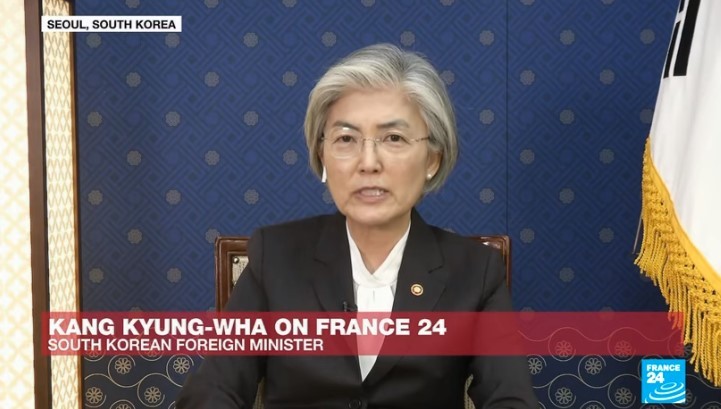 |
Foreign Minister Kang Kyung-wha speaks during an interview with France 24 on Monday. (France 24) |
South Korea’s quick and preemptive response to the coronavirus outbreak stems from the painful experience of the Sewol ferry disaster in 2014, said Foreign Minister Kang Kyung-wha in an interview with foreign media.
“We acted quickly and preemptively and that is not just our philosophy but is a reflection of our recent experience,” Kang said during an interview with French news channel France 24 on Monday. “You may know that in 2014, we had a terrible ferry boat accident where we lost 304 lives in the midst of very inept response from the government at that time. And that has been a collective trauma for all Korean people.”
She also talked about the outbreak of Middle East respiratory syndrome in 2015, when the reaction of then-President Park Geun-hye and her administration was initially “opaque” and “dismissive,” drawing severe criticism from the public.
“So from the very beginning, we were of a mindset and the government machinery was ready to act quickly and preemptively. That is what we’ve done, and have been uncompromisingly transparent and open in the process,” she said.
“Our fight about the virus is about robust testing, very vigorous tracing and quick treatment of the patients. In addition to being transparent and open, we have also been adapting responses to the changing nature of this challenge of a new virus, the nature of which we don’t fully understand as of yet.”
South Korea, which once struggled with the worst outbreak outside China, has largely managed to flatten its curve, with the daily tally reported to be around 30 -- in contrast with late February, when it peaked at more than 900 -- thanks to massive testing and intensive contact tracing.
But concerns remain as a second wave of cases, especially from overseas, is growing and recovered patients are testing positive again. On whether South Korea would impose a lockdown or stricter social distancing guidelines in light of the changing circumstances, Kang emphasized that the nation values “openness” and “freedom of movement.”
“Our approach has been from the very beginning, by default, respecting the people’s right to freedom of movement and then to implement measures where necessary and proportionately to the needs to manage the risk,” she said, adding that South Korea had mandated a 14-day self-quarantine for nearly all travelers entering from overseas as the number of imported cases surged. “Our measures have adapted to the evolving nature of this challenge but the principle has been to preserve that openness to very best of our ability, and that has meant a great deal of work for the government.”
She said the idea of a mandatory lockdown or blockade would not be acceptable to South Koreans and that the country had not imposed one even at the height of the crisis.
On North Korea’s assertion that it was “virus-free,” Kang said it should be taken with a “grain of salt” and that the government was closely monitoring the situation. Stressing the importance of cooperation between the two Koreas in the health sector, she said Seoul had offered to cooperate with Pyongyang but had not yet received a positive response.
By Ahn Sung-mi (
sahn@heraldcorp.com)





![[Herald Interview] 'Trump will use tariffs as first line of defense for American manufacturing'](http://res.heraldm.com/phpwas/restmb_idxmake.php?idx=644&simg=/content/image/2024/11/26/20241126050017_0.jpg)


![[Herald Review] 'Gangnam B-Side' combines social realism with masterful suspense, performance](http://res.heraldm.com/phpwas/restmb_idxmake.php?idx=644&simg=/content/image/2024/11/25/20241125050072_0.jpg)